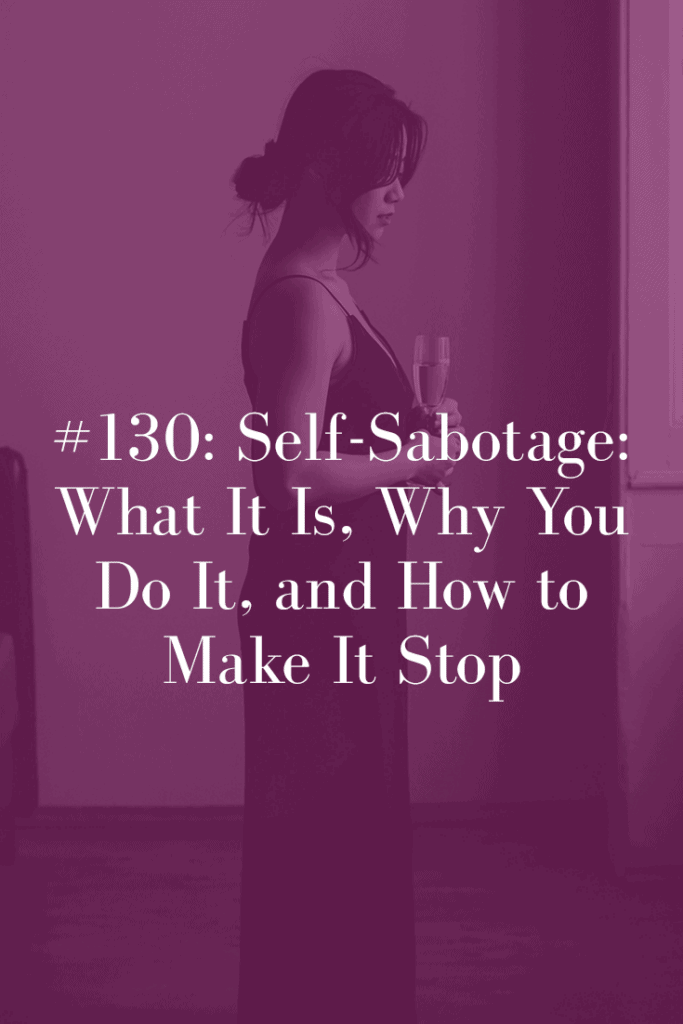
Self-sabotage can show up in any relationship: with our partner, boss, friend or, the one that hurts the most, in our relationship with ourselves! When you self-sabotage you’re holding yourself back from the person you want to be. Today I’m going to teach you why you self-sabotage, the surprising ways it can show up that you didn’t even realize and my 4-step process for stopping the sabotage and creating connection and trust in all your relationships.
What is Self-Sabotage Exactly?
If you self–sabotage it means you have thought patterns and behaviors that stop you from doing what you say you want to do and reaching your goals and dreams. These limiting beliefs show up in 2 ways:
- Most are unconscious so you don’t even realize you’re acting from them such as not realizing that your procrastination is actually a sign of something deeper, or
- You consciously know what you think but you believe your thoughts are a fact, so haven’t thought to change them. An example of this would be thinking a fact is that you really can’t trust men. You’ve had lots of interactions with men that all prove your theory, so it becomes something like grass being green – it just is. Because of this belief, all your interactions with men are through that lens and you keep proving yourself right (this is called confirmation bias) but it becomes a form of self-sabotage.
But Why Do I Self-Sabotage, Abby?!
There are many reasons people self-sabotage, but they all break down to one thing: protection. Your brain believes these behaviors are protecting you from some kind of emotional hurt. You end up avoiding true intimacy, vulnerability and emotional closeness with yourself and other people which, of course, protects you. If you’re not truly close to someone, your emotional brain thinks you can’t get hurt.
Am I Self-Sabotaging, Abby?
Self-sabotage shows up in a bunch of ways you might not recognize as self-sabotage so it’s important to know the most common signs:
- Criticizing or picking fights with others: You’re impossible to please, and your partner eventually gives up trying and breaks up with you. Or it’s your first day at your new job and you’ve got something negative to say about everyone.
- Cheating in some way: Browsing dating sites; following busty women on Instagram; flirting with a coworker; having a physical or emotional relationship with someone else are all ways you’re keeping your options open (consciously or subconsciously) so you can avoid emotional closeness and hurt.
- Self-harm behaviors: Abusing drugs or alcohol, binging, purging, eating poorly, staying up too late, and not taking care of yourself.
- You’re a perfectionist with sky-high expectations
- Being jealous or paranoid: You worry that your partner is seeing someone behind your back or that Jane at work is out to get you fired. You become a control freak and demanding with your partner or with your boss about getting rid of Jane.
- Rages, anger and resentment: Holding a grudge or staying resentful is a way of protecting yourself by pushing away other people. As long as you’re mad, no one can really get close to you.
- You tear yourself down: “What’s wrong with me?” I’m always X; I can never Y. I’m a big, fat pig. I look disgusting.” You put your low self-esteem out there and almost dare your partner to break up with you or for others to put you down too.
- Procrastination: You put off doing that report for work because you unconsciously or consciously don’t think you know what you’re doing. By doing it at the last minute, you don’t give it your best so, if you fail, there’s an excuse and you get a feeling of control over the situation – you’re deciding when you’ll do something but often you’ll cut of your nose to spite your face in these situations.
- Trouble stating your needs: When you consistently don’t say what you need you’re likely self-sabotaging. Not only will you ruin relationships and jobs this way, it’s yet another way to guard yourself from hurt. “If I don’t say what I want, they can’t reject me.”
What the Heck Should I Do, Abby?
Step 1: Be Mindful
Mindfulness simply means that you’re aware of what you’re thinking so you don’t let your thoughts and feelings blindly drive your actions and behaviors. Mindfulness puts you in control of your life and gives you a pause button instead of just reacting.
If you’re not mindful and aware of how you’re feeling in a moment you won’t be able to stop your self-sabotaging thoughts and behaviors. There are many roads to mindfulness, but the absolute best thing is to start meditating (yes, I’m on that again too). If you’re not already doing this, you can sign up for my free Meditation Starter Kit, which starts you at just three minutes a day (you know you have 3 minutes)!
Step 2: Identify Your Feelings
Identifying feelings is a skill, believe it or not. And just like any other skill, the more you do it, the better you’ll get. The key is to ask yourself, “What else am I feeling?” Sometimes it’s helpful to have a list of feelings you can choose from to prime the pump a bit. There’s an excellent list of feelings from the Hoffman Institute that I refer my clients to. I especially like it because it also identifies body sensations you may be having which you might not realize are prompted by your feelings.
Step 3: Start Identifying Your Thoughts
Ask yourself questions about these feelings you’ve tracked to uncover what’s really going on so you can change it.
I highly suggest you journal these answers. You can do it in your head but it’s not going to get you there easily. If you don’t want to journal, then get yourself to a therapist to discuss these items out loud.
Some journaling might be general prompts and questions such as:
- Do I get uncomfortable when things are going well or when I’m successful?
- Do I focus mostly on the positive or negative aspects in other people (or get more specific in an area – in my partners, boss, friends, coworker, mom)?
- Do I only feel good when someone else tells me I’m good?
- When I feel close to people I…
- When I succeed I…
- I feel best when…
- Do I often look back at something and realize I overreacted or wonder why I got so upset? (We say that when it’s hysterical, it’s historical).
- I always…
- I never…
- I’m always…
This will definitely give you lots to think about and you can also ask more specific questions about situations where you noticed your unwanted feelings:
- I’m anxious around my boss because…
- I feel resentful when I think my partner doesn’t have my back and I don’t say how I really feel to them because…
Step 4: Change the Game
As you begin to uncover and begin to understand all these feelings and thoughts you can finally begin to change them. You can choose new reactions and actions. You can choose to think differently about a situation and ask yourself some deeper questions such as:
- Why do I think it’s my partner’s job to have my back? Why don’t I have my own back and why isn’t that enough?
- Is it possible my partner does have my back, but they express it in ways I’m not noticing?
- What else could be true about how my partner feels about this situation?
Ultimately, to change the game, you’ll need to take full (yes, full) responsibility for your life and everything in it. This means no more blaming other people, no more waiting for them to rescue you (reassure you, give you a compliment, or fix an issue by standing up for you).
This means it’s time to start seeing these things as a “you” issue and not a “them” issue. With every situation, think about how you can take responsibility to see the situation or person through a different lens where you’re not a victim, where you don’t blame and where you’re not counting on others to be a certain way for you. It’s all about you being a certain way for you. It’s all about you feeling confident and secure and loving yourself, no matter what.
Resources and Links:
How Attached Are You to Your Partner?
How to Make Mindfulness a Consistent Habit
How 5 Minutes of Mindfulness a Day Will Make Your Relationship Great
Mindfulness: 2 Hacks for Remembering to Be Mindful
Hoffman Institute Feelings List
8 Ways to Build Your Confidence and Self-Esteem
Is Self-Compassion the Secret to a Healthy Relationship?












